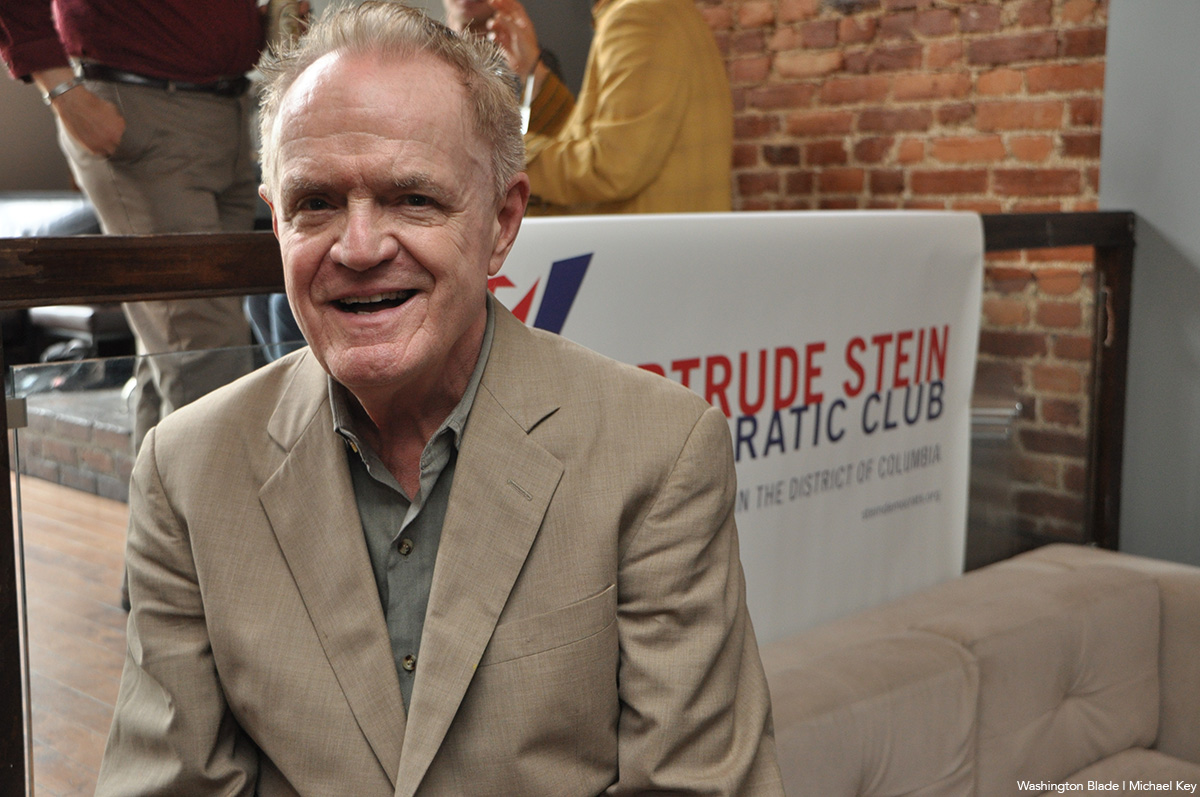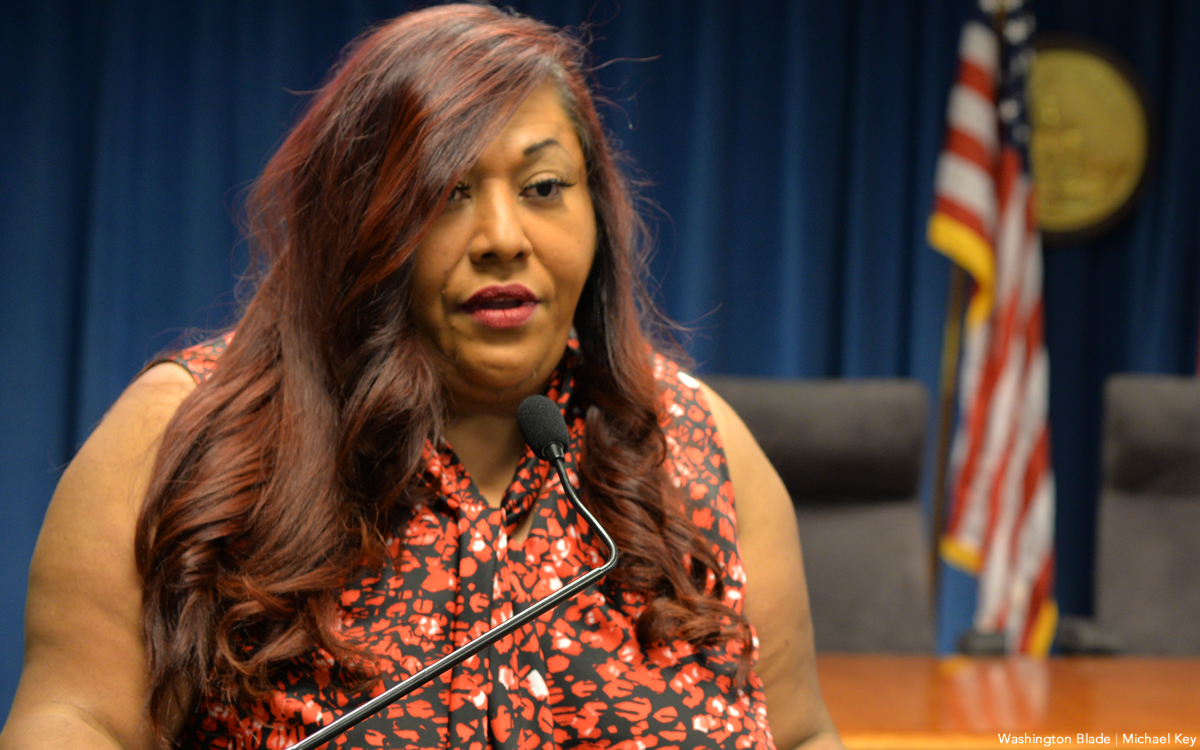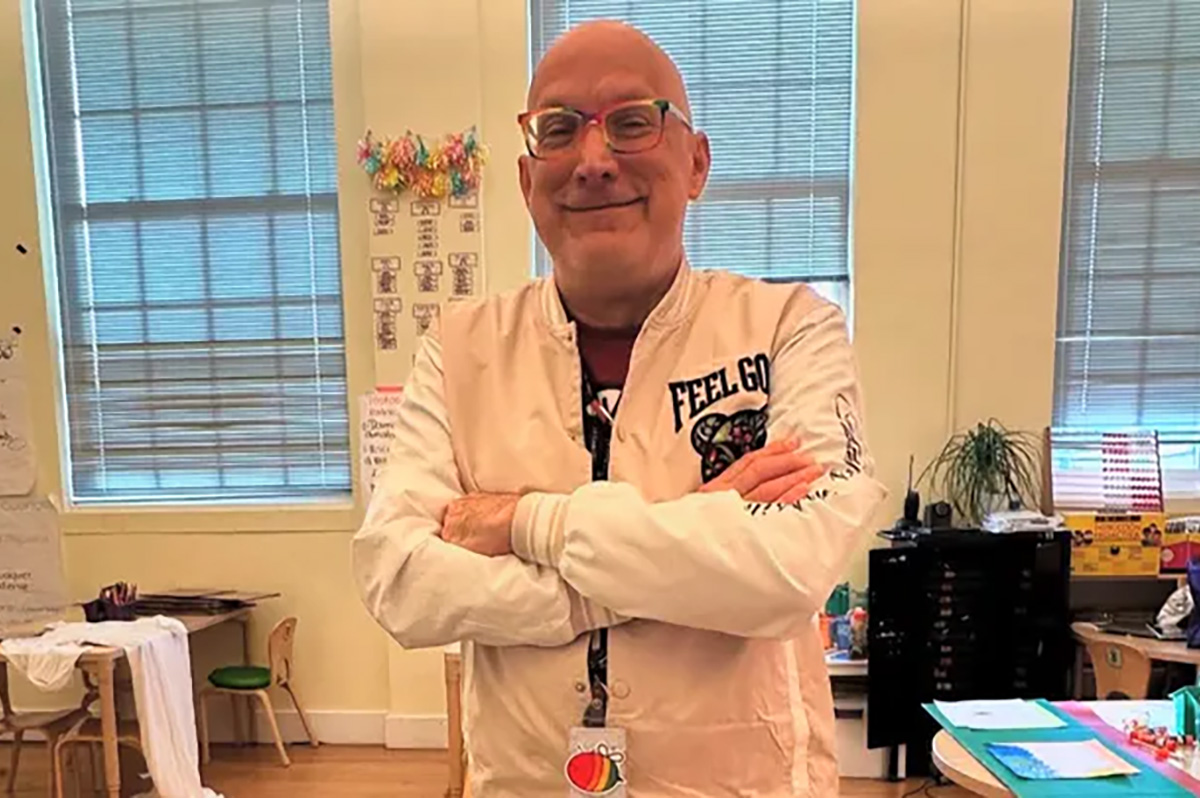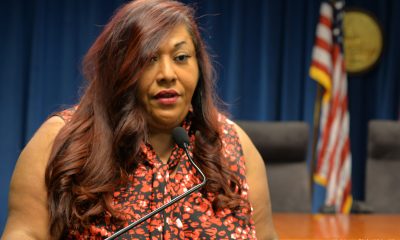District of Columbia
‘Behind-the-scenes’ activist Paul Kuntzler marks 62 years in D.C.
Inspired by Kennedy, Michigan native played key role in early LGBTQ movement

In reflecting on his many years of involvement in U.S. politics and the LGBTQ rights movement, Paul Kuntzler points out that Dec. 28 of this year will mark his 62nd year as a resident of Washington, D.C. And he also points out that two days before that, on Dec. 26, he will celebrate his 82nd birthday.
Those who have known Paul Kuntzler over the years say that while his is not a household name in politics and the LGBTQ rights movement, he has played a critical role as an everyday hero and behind-the-scenes organizer for the Democratic Party and the local and national LGBTQ rights movement.
Among other things, Kuntzler served as campaign manager for D.C. gay rights pioneer Frank Kameny’s 1971 role as the first openly gay candidate for the U.S. Congress when Kameny ran for the newly created position of non-voting Delegate to the U.S. House of Representatives for D.C.
In his role as campaign manager, Kuntzler is also credited with arranging for more than a dozen volunteers from the then-Gay Activists Alliance and Gay Youth group of New York City to come to D.C. on a bus that the Kameny campaign paid for to help gather the needed 5,000 signatures to get Kameny’s name on the ballot.
“I knew how difficult that was going to be,” Kuntzler said. “And I recognized we were not going to do this all on our own,” adding that the gay volunteers from New York, who joined forces with local D.C. volunteers, obtained a total of 7,800 signatures of registered D.C. voters to get Kameny’s name on the ballot.
Although Kameny finished in fourth place in a six-candidate race, his run as the first openly gay candidate for the U.S. Congress drew national publicity, including support from actor Paul Newman and his wife Joanne Woodward, who made a $500 contribution to the Kameny campaign while they were performing at the time at D.C.’s National Theater.
Observers of the LGBTQ rights movement at that time considered Kameny’s candidacy an important development in the effort to advance LGBTQ rights both in D.C. and nationwide.
“Looking back, that probably was one of the most significant things I did in my life,” Kuntzler said in recalling his role as Kameny’s campaign manager.
He says his involvement in politics began in the summer of 1960 in his hometown of Grosse Pointe Woods, Mich., a Detroit suburb, when he co-founded the Grosse Pointe Young Democrats and served as a volunteer on the presidential campaign of John F. Kennedy.
“I met JFK at the Detroit airport and shook his hand,” Kuntzler recalls while he joined a crowd of supporters welcoming Kennedy on his arrival for a campaign tour in Michigan. “It was Labor Day weekend – Sunday, Sept. 4, 1960,” Kuntzler said in demonstrating an amazing recall of dates and events.
Kuntzler, who traveled to D.C. to attend the Kennedy inauguration on Jan. 20, 1961, said the idealism of the Kennedy administration prompted him to move to D.C. one year later to become involved in politics and the fledgling gay rights movement.
“I met Frank Kameny at Lafayette Chicken Hut on Sunday, Feb. 25, 1962,” Kuntzler says in referring to the then-popular D.C. gay bar. “And he was then president of the Mattachine Society of Washington,” Kuntzler noted, which was the first significant gay rights group in D.C. that Kameny co-founded.
“He invited me to attend the next Mattachine Society meeting,” Kuntzler recalls. “So, on Tuesday, March 6, 1962, at Earl Aiken’s apartment on Harvard Street, I became the 17th member of the D.C. Mattachine Society.,” Kuntzler continued. “And at the age of 20, I was the only minor involved in the gay rights movement consisting of about 150 people in five American cities,” he said. “I’m the only one still living of the original 17.”
His membership in the Mattachine Society of D.C. was the start of Kuntzler’s 50-plus years of involvement in the local and national LGBTQ rights movement. He recalls that he helped make history when he joined Kameny and other members of the Mattachine Society in April of 1965 for the nation’s first gay rights protest in front of the White House.
Kuntzler said he brought with him a large poster-size sign he made reading, “15 Million Homosexuals Protest Federal Treatment.” He said Mattachine Society of D.C. co-founder Jack Nichols asked permission to carry that sign on the picket line in front of the White House. Kuntzler gave him permission to do so.
To this day, Kuntzler says, he has a large United Press International photo of Nichols carrying the sign with Kameny, lesbian activist Lilli Vincenz, and Kuntzler standing beside him with the White House as a backdrop.
In the following three decades or more, Kuntzler served as an organizer and founder of several LGBTQ organizations and projects while pursuing a work career as a manager for several organizations. He served from 1973 to 2007 as assistant executive director for advertising, exhibits and workshop sales for the D.C.-based National Science Teachers Association.
His many behind-the-scenes involvements included serving in 1975 as the first treasurer for the Gay Rights National Lobby, one of the first national LGBTQ rights organizations based in D.C. that later evolved into the Human Rights Campaign in 1980, for which he also served for a short time as treasurer. In 1979, Kuntzler became a co-founder of the Gertrude Stein Democratic Club, D.C.’s first LGBTQ Democratic organization.
Also in 1979, Kuntzler helped found the National Convention Project, an effort to elect openly gay delegates and secure a “gay rights” plank in the platform at the 1980 Democratic National Convention. The effort resulted in the election of about 100 openly LGBT delegates to the 1980 convention from states across the country, including D.C. and the adoption of an LGBT supportive plank in the Democratic Party’s platform at that time.
Kuntzler said he and the others working on the project, which he called a success, were deeply disappointed when then-Democratic President Jimmy Carter lost the November 1980 presidential election to Republican Ronald Reagan. But he said he was inspired to continue his work on behalf of the Democratic Party and LGBTQ rights issues over the next several decades.
The person most important in his life, Kuntzler said, was his domestic partner Stephen Brent Miller of 42 years who died in July 2004.
“Stephen and I met on Friday, March 30, 1962, at Lafayette Chicken Hut,” Kuntzler said. “I was sitting on the side and Stephen was sitting in the middle, and I think he sent me a beer and then came over and sat down and we talked,” Kuntzler recalls. “We had our first date on the second Sunday in April of 1962.”
The two went to brunch before going to see a movie and then took a bus to get to Frank Kameny’s house. It was a housewarming party of the house that Kameny had just secured a lease to rent for his residence and his gay rights endeavors. Miller, a professional stenographer who later started his own court reporting business, Miller Reporting, quickly took on the role of being the loving spouse to a committed activist, people who knew the couple have said.
Kuntzler said his attendance at the Human Right Campaign’s annual Washington dinner last month, which is one of the nation’s largest LGBTQ events, in which President Joe Biden and first lady Jill Biden spoke, was a further sign of progress for the LGBTQ rights movement as he sees it.
Asked if he has any advice for the LGBTQ community at this time, Kuntzler said, “I think we need to continue to be vigilant … We need to continue to be vigilant.”
District of Columbia
Ruby Corado sentencing postponed for third time
Attorneys say former Casa Ruby director has ‘significant medical issues’

A federal judge on April 8 approved a request by defense attorneys to postpone the sentencing of Ruby Corado, the founder and executive director of the now closed D.C. LGBTQ community services organization Casa Ruby on a charge of wire fraud, from April 29 to July 29.
Court records show that Judge Trevor N. McFadden of the U.S. District Court for the District of Columbia approved a motion filed by Corado’s two defense attorneys on that same day calling for the sentencing postponement on grounds of health issues.
“Ms. Corado has significant medical issues,” the April 8 motion states. “She has an important medical appointment related to one of her diagnoses scheduled in June 2025 and will need time to recover from that appointment,” it says.
The motion gives no further details on Colorado’s medical issues. A.J. Kramer, director of the D.C. Office of the Federal Public Defender, whose attorneys are representing Corado, said the office has a policy of never disclosing specific medical related information regarding its clients.
Court records show that prosecutors with the Office of the U.S. Attorney for D.C. did not object to the defense motion seeking the third sentencing postponement.
The records show that an earlier postponement of the sentencing, from March 28 to April 29, was initiated by the judge due to a scheduling conflict. The first postponement from Jan. 10 to March 28 came at the request of Corado’s attorneys, court records show.
Corado pleaded guilty on July 17, 2024, to a single charge of wire fraud as part of a plea bargain deal offered by prosecutors. The charge to which she pleaded guilty says she allegedly diverted at least $150,000 “in taxpayer backed emergency COVID relief funds to private offshore bank accounts for her personal use,” according to a statement released by the U.S. Attorney’s office.
Prosecutors have said funds that Corado allegedly diverted for her own use were intended to be used by Casa Ruby in support of its various programs, including housing services for homeless LGBTQ youth and support for LGBTQ immigrants.
The U.S. Attorney’s statement also notes that in 2022, when “financial irregularities at Casa Ruby became public,” Corado sold her home in Prince George’s County, Md. and “fled to El Salvador.” It was at that time that Casa Ruby ceased its operations.
Court records show that FBI agents arrested Corado on March 5, 2024, at a hotel in Laurel, Md., shortly after she returned to the U.S. At the request of her attorney and against the wishes of prosecutors, another judge at that time agreed to release Corado into custody of her niece in Rockville, Md., under a home detention order.
The release order came seven days after Corado had been held in jail at the time of her arrest by the FBI.
Under the federal wire fraud law Corado could be sentenced to a possible maximum sentence of 30 years in prison, according to the U.S. Attorney’s statement. However, court observers have said that due to Corado’s decision to waive her right to a trial and plead guilty, prosecutors will likely ask the judge to hand down a lesser sentence than the maximum sentence.
The statement by prosecutors points out that Corado’s decision to plead guilty to the one charge came after she had been charged in a criminal complaint filed on March 1, 2024, with bank fraud, wire fraud, laundering of monetary instruments, monetary transactions in criminally derived proceeds, and failure to file a report of foreign bank accounts.
All those charges except for the wire fraud charge were dropped at the time of her guilty plea.
District of Columbia
A room with Pride: D.C.’s LGBTQ history finds a new home at the Eaton
New suites highlight city’s queer community

Blocks away from where Frank Kameny once organized the first pickets for gay rights in Washington, a new hotel suite invites guests to relax, recharge, and revel in the LGBTQ history of the city with the capital’s first-ever Pride-themed room at the Eaton Hotel.
From the walls covered in Washington Blade archival photos from the past 50 years, to a vinyl library that spans decades and genres of music celebrated by LGBTQ fans, and little affirmations written on the mirrors, it becomes clear as soon as you open the door that this room is one of a kind.
The Blade sat down with Nina Ligon, the director of culture for the Eaton, in the suite to discuss why the boutique hotel has chosen to debut a Pride-themed room and how their unique mission-driven hospitality is at the center of it all.
Starting with how the relationship between the Blade and Eaton came to be, Ligon explained that the collaboration with D.C.’s principal LGBTQ newspaper has been around longer than she has been with the hotel.
“The Blade has always been present,” Ligon said. “It’s one of the entities here in the city that’s just always been around. When I came into my position here at Eaton, Sheldon Scott — our original director of culture who helped open the hotel — already had a relationship with Stephen [Rutgers] and other members of the Washington Blade. Through that we have been able to establish a really strong relationship in the city.”
That relationship flourished after the boutique hotel, which sees itself as more than a hotel — but a cultural hub for those wishing to explore Washington — was nominated for the Best of LGBTQ DC Awards, given out and published by the Blade.

“Beginning in 2022 we were first voted for best LGBTQ hotel in the city by the Best of LGBTQ DC Awards,” she said. “In 2023 we fell off, but that’s all right. We did get Editor’s Choice in 2024, and we’re gonna make a comeback.”
That comeback, Ligon hopes, is aided by the addition of the new Capital Pride-themed hotel suite, which used feedback from LGBTQ hotel staff to determine what went in the room.
“It’s community. We have a really great team here at Eaton, so we were able to put together a committee with anyone who wanted to be involved and have some say. And that’s not just the pride suite specifically, but World Pride in general — in our pride efforts, 365, right throughout the year. A lot of these,” she said, pointing to the walls covered in framed photos taken from the Blade archive, “are ideas that came up during those early meetings just a few months ago. There were discussions of inflatable chairs and disco balls, and I was for it. I’m here to support their creative vision. And you know, we have to involve the corporate folks, and they’re a little more traditional than some of us. But the team really came together with some of the pieces and the timeline wall art that we’re working on.”
Ligon continued, explaining that special attention was given to ensure diverse LGBTQ experiences are represented in the room. From the pictures of LGBTQ icons like Marsha P. Johnson and RuPaul, to the music on their sound system (including Chappell Roan’s “The Rise and Fall of a Midwest Princess” and Troye Sivan’s “Bloom”), and the quotes on the walls, their goal was to uplift the whole LGBTQ community rather than one particular identity.
“My colleague, Eduardo [Romero], who’s been just a beam of light in my life, brought this to my attention. As a Black woman, I was reading through the Blade’s archive links and was sifting through some of those and he was like, ‘Okay, yeah, these look good, but there’s some people who are missing.’ Capital Pride has been traditionally cis, white male led. He helped me, as a Black woman, to step back and say. ‘Say, oh, wait, there’s more that we can be representing here. There are more people we could be representing.’ And so I reached out to DC Black Pride to see what image imagery they may have had and what input they had. And we were able to come up with a little something.”
As the tour of the room came to a close, Ligon told the Blade what she hopes people get from staying in this suite.
“When it comes to Pride, Pride is resistance,” she said. “Pride is more than just a party. Pride is an opportunity. It started with people who were fighting for their rights and their mere existence. And so I really want people, whether they come here to party or to take a load off, I really want them to take some time to reflect and see Pride for what it is, and that first being a form of resistance as we chart the course forward into a brighter future for the LGBTQ community and for all. None of us are free until we are all free. And I hope that this will be a reflection of that.”
The Eaton Hotel is at 1201 K St., N.W.

District of Columbia
Little Gay Pub to host April 25 celebration of life for Patrick Shaw
School teacher, D.C. resident praised for ‘warmth, humor, kindness’

Co-workers and friends will hold a celebration of life for highly acclaimed schoolteacher and D.C. resident Patrick Shaw beginning at 5:30 p.m. Friday, April 25 at The Little Gay Pub 1100 P St., N.W.
Little Gay Pub co-owner and Shaw’s friend, Dusty Martinez, said Shaw passed away unexpectedly on April 19 from a heart related ailment at the age of 60.
“Patrick touched so many lives with his warmth, humor, kindness, and unmistakable spark,” Martinez said. “He was a truly special soul – funny, vibrant, sassy, and full of life and we are heartbroken by his loss.”
In an Instagram posting, Shaw’s colleagues said Shaw was a second-grade special education teacher at the J.F. Cook campus of D.C.’s Mundo Verde Bilingual Public Charter School.
“Patrick brought warmth, joy, and deep commitment to Mundo Verde,” his colleagues said in their posting. “His daily Broadway sing-alongs, vibrant outfits, and genuine love for his students filled our community with energy and laughter.”
The posted message adds, “Patrick was more than a teacher; he was a light in our school, inspiring us all to show up with heart, humor, and kindness every day. His spirit will be deeply missed.”
The Washington Blade is preparing a full obituary on Patrick Shaw to be published soon.
-

 District of Columbia5 days ago
District of Columbia5 days agoD.C. police seek help in identifying suspect in anti-gay threats case
-

 Virginia2 days ago
Virginia2 days agoYoungkin calls on gay Va. GOP LG candidate to exit race over alleged ‘porn’ scandal
-

 Opinions5 days ago
Opinions5 days agoOn Pope Francis, Opus Dei and ongoing religious intolerance
-

 Commentary4 days ago
Commentary4 days agoA conversation about queers and class










